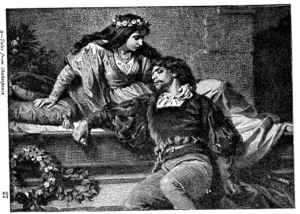 While reading Annie Dawid’s Paradise Undone, I kept thinking of a passage near the end of Shakespeare’s Romeo and Juliet:
While reading Annie Dawid’s Paradise Undone, I kept thinking of a passage near the end of Shakespeare’s Romeo and Juliet:
See, what a scourge is laid upon your hate,That heaven finds means to kill your joys with love!And I, for winking at your discords too,Have lost a brace of kinsmen. All are punished. All are punished!
And it’s true: the main characters of Dawid’s book, Watts Freeman, Truth Miller, Virgil Nascimento, and a fictionalized version of Marceline Baldwin Jones, are all punished again and again, before and after November 18, 1978.
The characters/narratives are as diverse as Peoples Temple itself: Watts Freeman tells his story primarily through an interview with a public radio host; Truth Miller is a white woman who has never fully left the Peoples Temple behind, even as she gets older; Virgil Nascimento is loosely based on Laurence Mann, the Guyanese ambassador to the United States; and Marceline, the long-suffering wife of Jim Jones, finally finds a voice after years in her husband’s shadow. Her narrative also the strongest. Through her eyes, we learn how she meets Jim Jones at the hospital where they both work (he was an orderly; she was a nurse), and how she endures their marriage. Often, I have wondered why the real Marceline stayed. Through Dawid’s characterization of Marceline, we see her struggling with her husband’s infidelities and mistreatment of the Temple’s members, knowing it’s wrong. But we also see her belief – certainly grounded in reality – that there is nothing she can truly do. Dawid gives the reader empathy for Marceline, in that she was truly stuck in a situation she could never escape.
Truth Miller, the longtime believer of the Temple, can be hard to empathize with. Years after the tragedy, she still labels characters who left the Temple as “That Woman” or “traitors,” when the reader knows the fact that Temple members left an unhealthy environment. But Dawid does well by making Truth sympathetic, locked in a prison she can’t leave, even if the prison is of her own making. Her son was conceived because she couldn’t leave it behind, but Cuffy – named after the leader of an unsuccessful slave revolt in Guyana who was highly esteemed in Jonestown – also makes her realize that if she can’t leave the past behind, she’ll have nothing left.
Watts Freeman is a composite of several people who left Jonestown during the massacre. He talks to a radio reporter about what happens. What Dawid does well reminds me of the Haitian way of telling stories: “Krik?” says the one who wants to hear the story. “Krak” is the response. And so the story begins. In this case, the reporter asks Watts to tell his story by saying Krik for us, the audience. Freeman tells the story of his Krak, about his escape on November 18th, but never fully getting over what happened that day.
The narrative of Virgil’s is the one that slows things down. A well-read man, he is embittered about what happened on November 18th, and shows it towards the woman he is married to, a woman who was part of Jim Jones’ inner circle. While I understood many of the references Virgil talks about here, a reader with only a limited knowledge of Peoples Temple might not understand them. Virgil is quite clearly haunted by what happened, but too many facts and information weigh the plot down.
There are other minor discrepancies as well: a daughter not mentioned by Marceline in her narratives suddenly appears in the epilogue; Truth Miller changes her name again to a Russian variant of her birth name without explanation; Edith Roller, the real-life Temple diarist, is mentioned in the epilogue yet is not mentioned in the book.
Finally, it is one thing for a book’s ending not to tie everything up in a neat bow; it is another to be as abrupt as I found this to be. Still, the case can be made that 45 years later, survivors, surviving family members, and those unrelated to the Temple still find the events of November 18th as abrupt and unresolved as Dawid presents them.
Jonestown is peopled with the ghosts of the past, ghosts that still haunt us, and Dawid’s book shows us how present, restless, complicated, and ultimately human, they still are.
(Jennifer Kathleen Gibbons is a regular contributor to the jonestown report. Her complete collection of articles is here.)